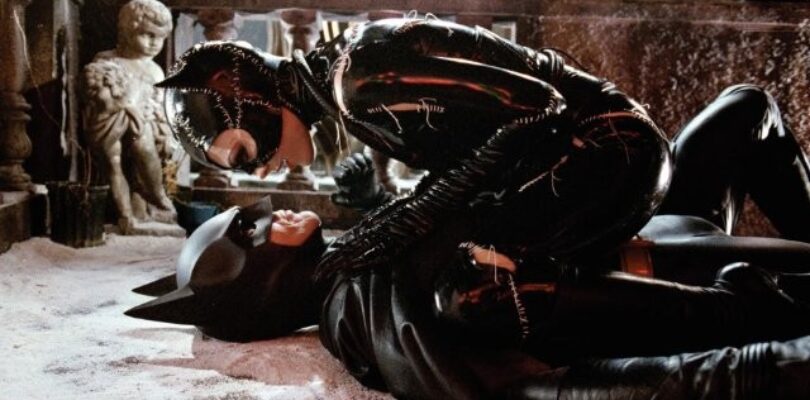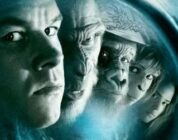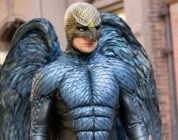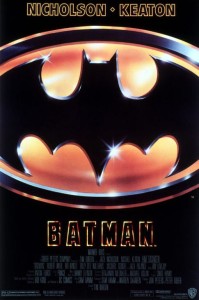
Before I get into my assessment of the movies, looking back on the choice to have Tim Burton direct the first modern Batman movies is an odd one. Before Batman, his only feature-length directing experience were Pee-Wee’s Big Adventure and Beetlejuice – both good movies in their own regard, but it’s hard for me to understand the leap from quirky comedies to the tent pole of DC Comics and their reintroduction into the world of cinema. Sure, modern day Tim Burton would be perfect for the Batman franchise because of his almost pseudo-gothic and quirkily dark and humorous filmmaking style, but the late-1980s Tim Burton hadn’t quite proven himself to be a major player just yet. At this point, we were two years removed from the atrocious Superman IV: The Quest for Peace, so Batman had to be a hit. A hit it was. It was nominated for several awards and re-launched a franchise. If I had the choice to make back then, I don’t think Tim Burton and Mr. Mom would have been my first choice to revive DC Comics from their cinematic coma. They made the right decision though, because it worked and I think the success of Batman opened up the door for Burton to make the kinds of films he really wanted to make.
When discussing the first flick, the one thing I was struck with after re-watching it is that it felt more dated than Batman (1966). For one thing, having Prince perform the soundtrack really dates it and places it firmly in a certain moment of time. Regardless of how amazing Danny Elfman’s score is (which it is), you just can’t escape the sappy pop of Prince’s soundtrack. It’s weird, I like Prince as an artist, but listening to his work on this soundtrack this week really soured my viewing experience.
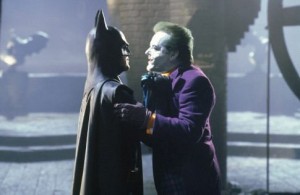
Jack Nicholson and Michael Keaton in “Batman.” © 1989 Warner Brothers All Rights Reserved.
Personal gripes about Prince aside, I also began to find more cracks in the façade as well. First, Michael Keaton is no billionaire playboy. You can hide under the cowl and make a competent Batman, but if I can’t buy you as Bruce Wayne, then it ruins the enjoyment of the movie for me. Nine-year-old me didn’t care about this at all, but thirty-something me certainly does. I’ve had twenty plus years of Batman education and I need to see it all now. Thankfully though, even though his name is on the marquee, this movie is more about Joker than it is Bats…and Jack Nicholson was inspired casting (even though the comic purist me didn’t like how they changed it so young Joker was the one responsible for the death of Batman’s parents – sure it makes the story telling neat, but it just takes something away). Nicholson put a nice spin on the Joker character and really drove the movie forward. I was even the Joker for Halloween that year. In fact, if it wasn’t for Heath Ledger’s performance of Joker, Nicholson slightly edges out Romero on my list of favorite actors to take on the role. I think part of my enjoyment of Nicholson’s Joker has to do with his henchmen as well, namely Bob. His character is so minimal and yet, he steals every scene he’s in. Henchman Bob is, without a doubt, the best henchman to date in any Batman film.
The one thing I noticed most about Batman now is that it doesn’t feel like a Tim Burton movie. It’s pretty straight-forward for the most part. Burton has a distinguishable tone, mood, and vision for his films these days, and with Batman, I don’t see that vision. I almost wonder if the studio may have had him on a short leash. After experiencing more than twenty years of Burton films, Batman feels so vanilla. I’m not even bringing up the cheesy effects, animations, and continuity goofs.
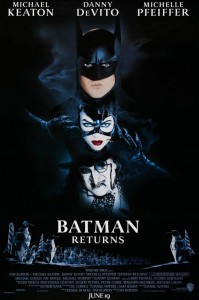
With the casting of DeVito and Pfeiffer, Burton and team nailed the villains again. Even though these are Batman movies, the villains are as, if not more, crucial than Batman himself. If you get those wrong, your movie is doomed (which explains Joel Schumacher’s offerings to this franchise), and the casting in Batman Returns is the best in the franchise up until Ledger joined the Nolan trilogy. Speaking of Nolan, while Hathaway appears to be good casting for his rendition of Catwoman, I don’t think she’ll hold a flame to what Michelle Pfeiffer did with the role. She even surpasses Julie Newmar’s Catwoman.
Before I wrap up Burton’s run helming Batman, I must bring up two things: the Batmobile, and the villain’s deaths. Burton has the coolest of all Batmobiles in all of the Batman franchise, which is always an added plus. While the ’66 Batmobile is a pure classic, Burton’s Batmobile is just too bad ass to ignore. From the shields, to the sleek black design, it’s the kind of car that will strike fear in the minds of most petty criminals. After Burton’s Batmobile, Schumacher and Nolan’s choice for vehicles just don’t stack up.
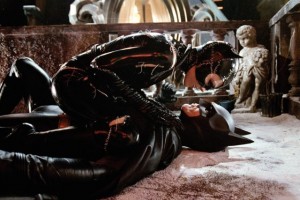
Michelle Pfeiffer and Michael Keaton in “Batman Returns.” © 1992 – Warner Bros. Entertainment Inc.
Also, even though I liked the Joker and the Penguin in the Burton movies, why couldn’t the screenwriters come up with more original ways to kill them off? I would choose not to kill them myself because I don’t like the idea of Batman losing two important arch-enemies, but no one asked me. Watch the movies again and you’ll find that they both meet their end by falling from a high point to the ground. Seems like a cop out and a less-than-fitting deaths for the both of them.
It pains me to say this, but when it comes to Tim Burton and his Batman films, Batman Returns is the superior flick. Where Batman followed a formula, Batman Returns was a little more experimental and edgy. It really felt like the studio gave Burton a green light with this one. Unfortunately though, I think he made it a bit too dark considering what came next in the franchise.
Up Next: Next Week! Same Bat-Time! Same Bat-Site!
Joel Schumacher almost single-handedly kills the Batman franchise
with neon, bat nipples, and holy rusted metal!

